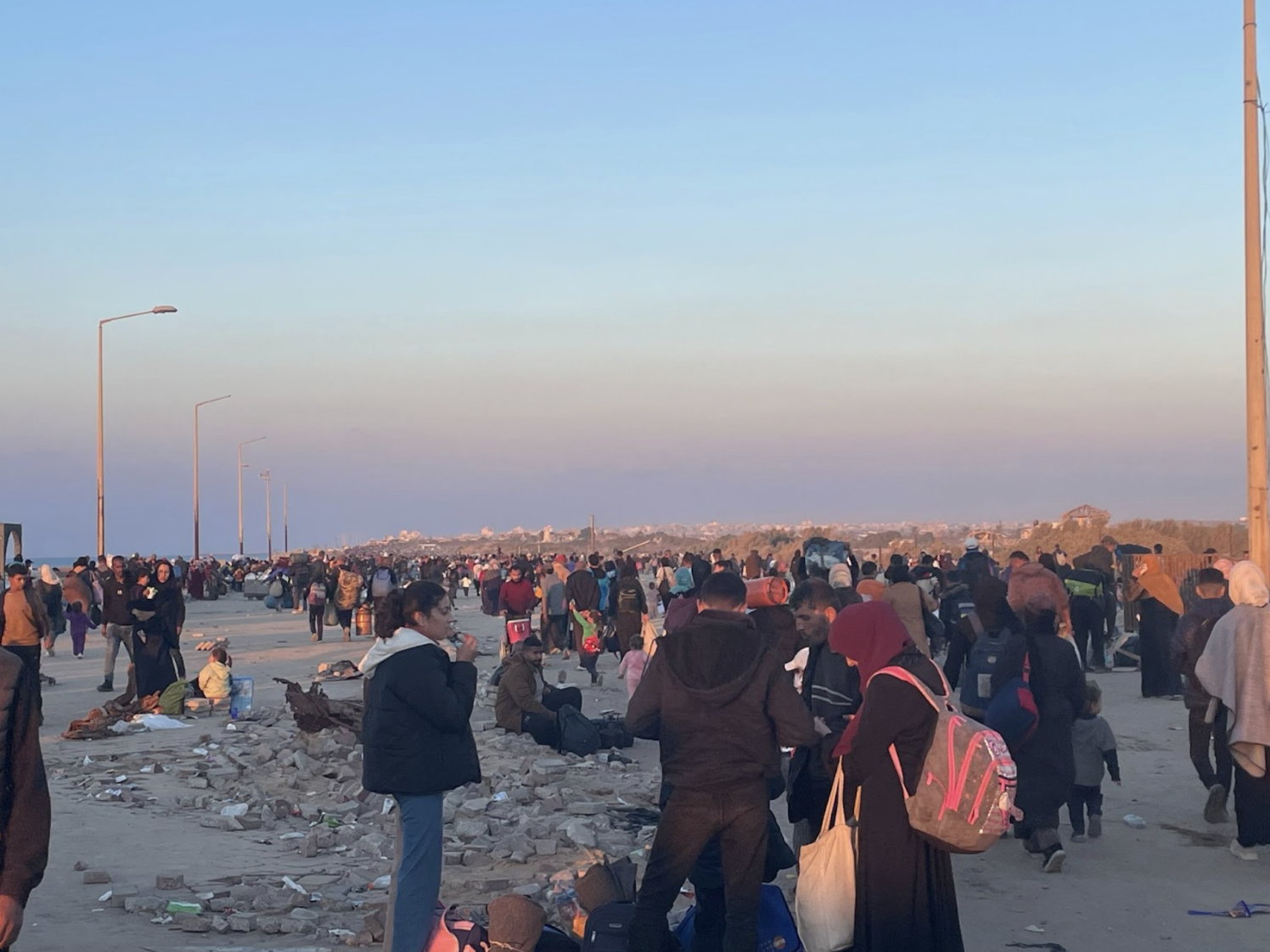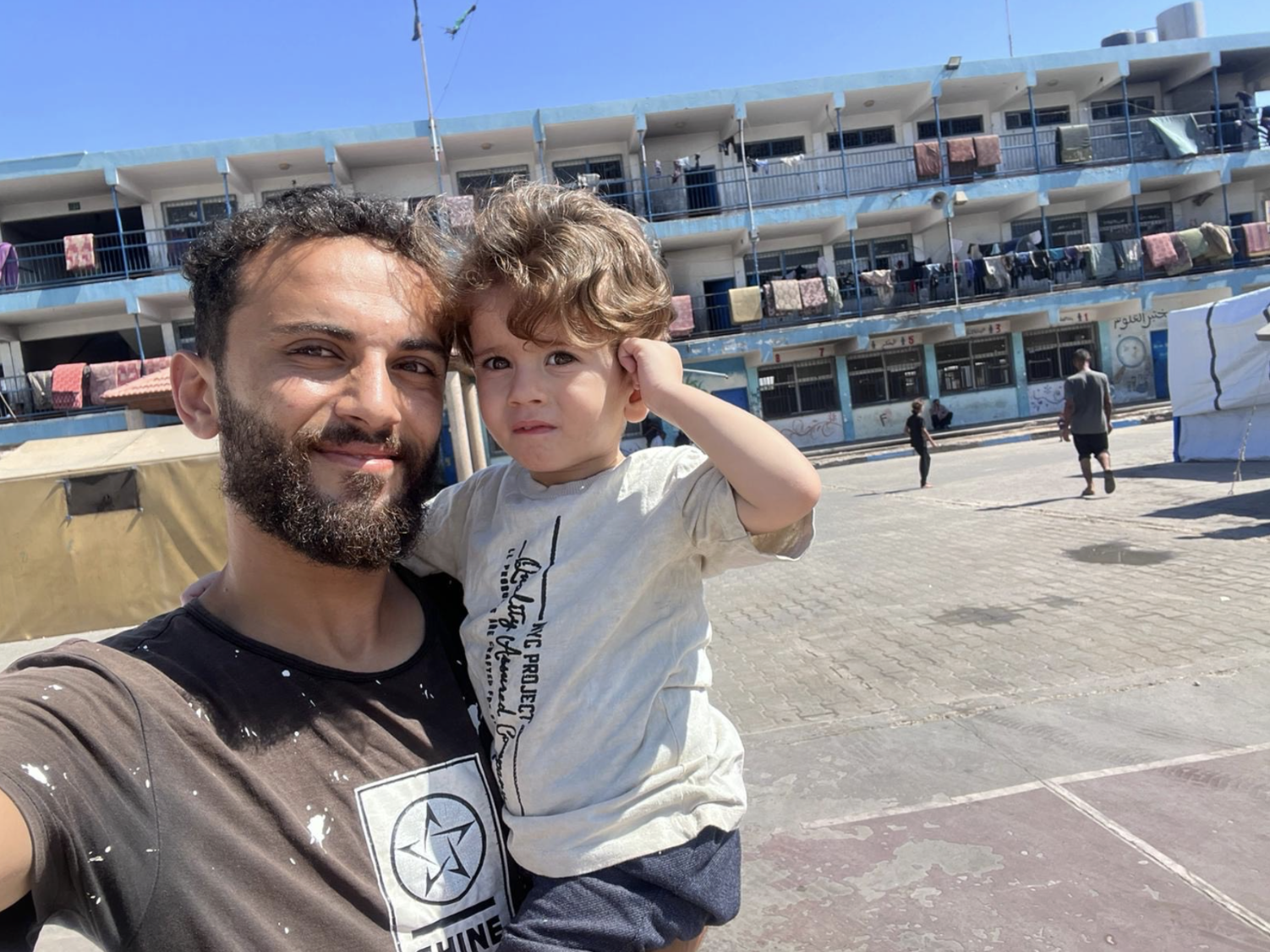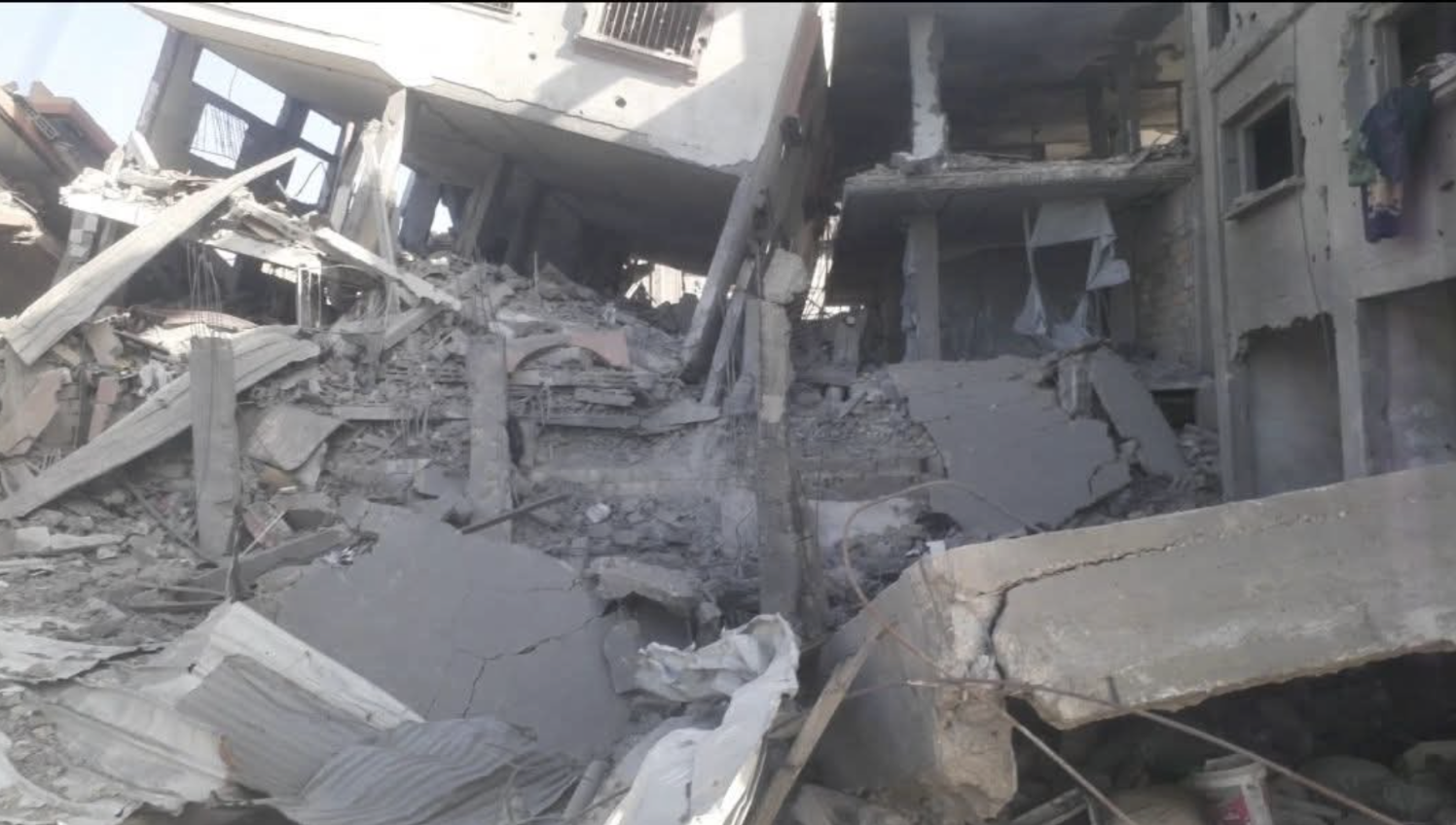"I have no home to return to": Gazans react to the ceasefire with skepticism, joy, grief
Palestinians returned to their homes during the ceasefire earlier this year that lasted 42 days before it was violated by Israel. Photo courtesy: Khaled Al-Qershali
By Khaled Al-Qershali. Hani Qarmoot contributed reporting.
October 12, 2025 — On the morning of October 9, 2025, Gaza held its breath. For two years, it endured relentless bombardment and famine, and for decades, its people had lived through cycles of conflict, displacement, and loss. But on that day, hope, fragile yet palpable, hovered over Gaza.
In al-Nuseirat camp, everyone awaited news from the ceasefire negotiations in Egypt. Mohammed Taher followed updates closely on Telegram, scanning every message for signs of the long-awaited ceasefire. His eldest son, Mahmoud, raised his device high, searching for the strongest signal. Across the camp, faint radio broadcasts echoed from neighboring tents, each household tuned to the same anxious rhythm.
Mohammed’s father, Abu Ali, 75, had witnessed Gaza’s most turbulent decades. He has lived through the First Intifada (1987–1993), the Second Intifada (2000–2005), and the wars of 2008, 2012, 2014, 2018, and 2021. And now, he has seen the deadliest chapter yet.
“I’m going to sleep,” he said. “It will be the same disappointment as always.”
As the hours passed, snippets of news suggested positive developments, but there was still a lot of uncertainty. Then, at around 2 a.m., there it was: “The ceasefire will take effect at noon today!” a Telegram message read.
“I never thought I would see this day,” Mahmoud whispered, crying, holding his youngest son, Walid, tightly. “After everything… after all we’ve lost… it’s finally here.”
The first phase of the ceasefire, brokered by the U.S. President Donald Trump, will see Hamas returning the living hostages to Israel who has, in exchange, stopped the bombardment, let aid trucks in, and gradually withdrawn from the strip. Details of the rest of President Trump’s 20-point ‘peace plan’, however, remain unclear.
The ceasefire comes after 734 days of relentless bombing that has killed over 67,000 Palestinians, displaced millions, and destroyed most of Gaza’s infrastructure. Israel has violated two ceasefires and a temporary truce before, leaving Palestinians skeptical that it will hold its end of the bargain this time.
As news of the ceasefire spread, thousands of Palestinians started their journey back to Gaza city, many returning to their homes reduced to rubble, and family members killed.
Mohammad Al-Ghoz with his son, Rakaan. Photo provided.
“I have no home to return to,” said Mohammed Al-Ghoz, 29. For him, the first day of the ceasefire felt no different from the past two years. “I’ve lost my job, my home, my memories, my friends, and my relatives during the genocide,” he added. “A ceasefire can stop the bombs, but it cannot bring back what has already been taken.” When Al-Ghoz returned to his home during the ceasefire earlier this year, it only lasted 42 days before Israel resumed its assault on the strip.
"Instead of attending school and meeting new friends, I am displaced in a school," said Lamar Hosam Shallah, who was only 11 when the genocide started. Even though she lost part of her childhood, she is now filled with joy with the ceasefire. "I am really happy with the ceasefire because the bombardments, famine, and displacement had ended," she said.
Shallah wants to go back to Gaza, where she was born and raised, attend school and play with her friends again.
Abdulrahman Ayman Shallah’s home in Al-Shijaia was destroyed by Israeli bombardment. Photo provided.
Even after the ceasefire, the Israeli occupation continues to colonize the eastern part of Gaza City, including: Al-Zaytoun, Beit Lahiya, Beit Hanoun, and Shuja'iyya, where Abdulrahman Ayman Shallah, 20, is from. Shallah couldn’t return to his destroyed home. "If I go close to my neighbourhood, I will be killed," he said. If the ceasefire holds, Shallah wishes to travel abroad to continue studying medicine because there are no schools or universities left in Gaza.
Some, however, are determined to come back to Gaza to rebuild it. Like Khaled Mohammed El-Hissy, 23, an editor for online publication, The Electronic Intifada. "I will continue publishing the truth until Palestine is free,” he said. El-Hissy is in Jordan receiving treatment for blood cancer. Once his treatment is complete, he plans to return home to help rebuild Gaza. “If I don’t help my country, then who will?”
Although the killing has stopped, Mahmoud Yasser Al-Yazji, a Palestinian PhD student in the United States, feels uncertain about President Trump's plan for Gaza after the genocide. "It is unfair to put a foreign governor on the people of Gaza," he said. His family is still in Gaza and will remain there. "They have known nothing but Gaza all their lives, and it is not the time nor will it be the time to leave Gaza," he said.
Mahmoud plans to use his education in war and post-war studies to give back to his country and help rebuild his community.
"I am happy that the genocide has ended but also overwhelmed with the memories of the suffering I endured in Gaza," said Heba Al-Maqadma, 24, who evacuated in September 2025 with a scholarship in Ireland. "The genocide has stolen two years of my life. For a year and eleven months in Gaza, whatever I did, felt hollow," she added. "Although I am out of Gaza, I still feel fear and anxiety.”
Back in al-Nuseirat, the first call to prayer after the ceasefire announcement saw people coming together on the streets. Voices rose in the camp, praising survival, mourning what had been lost, and offering thanks in a rare moment of shared relief.
“A ceasefire… after all these years… can it really be true?” said Abu-Ali in shock, while reading the messages. His disbelief eventually turned to joy.
As the ceasefire took effect on the noon of Oct 10, music and chants were heard in the camp instead of bombs and drones, people took to the streets carrying sweets and embracing neighbors, and children played on the streets again.
“For the first time in a long time, we can breathe, we can hope,” Mohammed said, looking at the children playing. “I never thought I’d see the possibility of going back [home], but maybe we can rebuild.”
The celebrations, however, were also tempered by the memory of loss. Many had lost their family, homes, and livelihoods.
Regardless of whether the ceasefire holds, one thing will: the people of Gaza, despite decades of devastation, remain resilient and unbroken.
Subscribe to the Palestine Nexus Newsletter:




